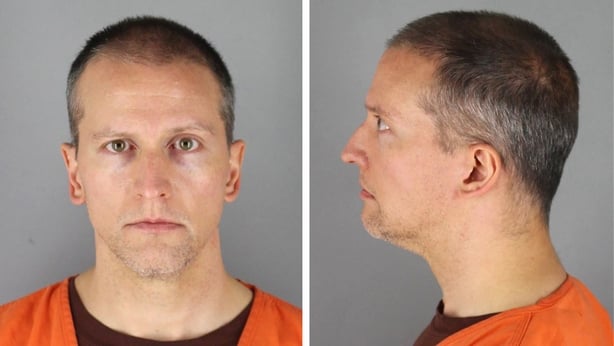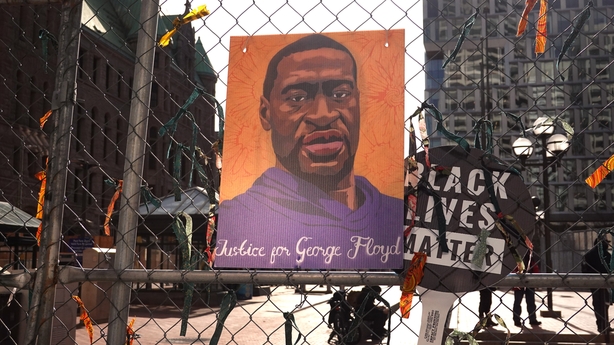The family of African American George Floyd has appealed for sweeping police reform on the anniversary of his murder by a white officer as they met President Joe Biden at the White House.
The president and Kamala Harris, America's first female and first Black vice president, hosted several of Mr Floyd's relatives in the Oval Office after the family spoke to top lawmakers hoping for progress on police reform.
The legislation being considered to increase police accountability would be named after Mr Floyd, who was suffocated after being pinned down under the knee of Minneapolis officer Derek Chauvin on 25 May 2020.
"If you can make federal laws to protect the bird, the bald eagle, you can make federal laws to protect people of colour," Philonise Floyd, George's younger brother, said as he emerged from the private meeting, which lasted over an hour.
Another brother, Terrence Floyd, said as he left the White House that he was encouraged by the "productive conversation" in which Mr Biden and Ms Harris were eager to "actually give an ear to our concerns".
Mr Floyd's mother, siblings and his daughter Gianna, along with family lawyers, had earlier gathered at the US Capitol with House Speaker Nancy Pelosi and other Democratic members of Congress.
While the adults discussed their hopes for police reform, it was seven-year-old Gianna - hugging her mother Roxie Washington - who eloquently addressed the lasting legacy of her late father, saying he would "change the world".
"He did," Mr Biden said in a statement after meeting the family nearly a year after their first encounter ahead of Mr Floyd's funeral.
Earlier today in the Oval Office, I met with George Floyd's family. They’ve shown extraordinary courage over the last year, especially his young daughter Gianna, who I met again today. The day before her father’s funeral, she told me, "Daddy changed the world."
— President Biden (@POTUS) May 25, 2021
He has. pic.twitter.com/gGIKqVIEFk
"The Floyd family has shown extraordinary courage, especially his young daughter Gianna, who I met again today," Mr Biden added.
He told reporters he was "hopeful" that a deal could be struck on the police reforms after the Memorial Day holiday this weekend.
"I got a chance to spend a lot of time with Gianna and the family," he said.
"They've been wonderful."
The death of Mr Floyd in Minneapolis on 25 May last year and subsequent conviction of the officer, Derek Chauvin, who had knelt on his neck for nearly nine minutes, were seen as seminal moments in the long US struggle for racial equality.
After the killing during Mr Floyd's arrest outside a store, protests and riots erupted across a country already crackling with tension from the election battle between Mr Biden and then president Donald Trump.

In the wake of the verdict this April against Chauvin, who faces sentencing next month, Mr Biden sought to build on political momentum by urging Congress to pass the far-reaching police reform bill in time for the first anniversary.
Americans must confront the "systemic racism" revealed by Floyd's killing "head on," he declared.
However, the ambitious deadline comes with only the House of Representatives having passed the bill, known as the George Floyd Justice in Policing Act, while the Senate continues to wrangle over key details.
The bill seeks to reform what critics say have become ever more violent and unaccountable police forces around the country.
Opponents argue that police are being unfairly blamed when they are simply trying to operate in a dangerous and often heavily armed society.

However, Mr Biden and reform proponents say that a culture of impunity and underlying racism have made incidents like Mr Floyd's death increasingly common.
Among other measures, the bill would ban potentially fatal restraint techniques used on suspects, like chokeholds.
It would also end so-called "no-knock warrants," when police are authorised to burst into a suspect's house unannounced - a volatile situation that led to the accidental killing of a black woman, Breonna Taylor, in Louisville, Kentucky, in March 2020.
The most far-reaching of the measures that senators are still debating would be to end current legal protections that block civil lawsuits against police accused of misconduct.
We need your consent to load this rte-player contentWe use rte-player to manage extra content that can set cookies on your device and collect data about your activity. Please review their details and accept them to load the content.Manage Preferences

